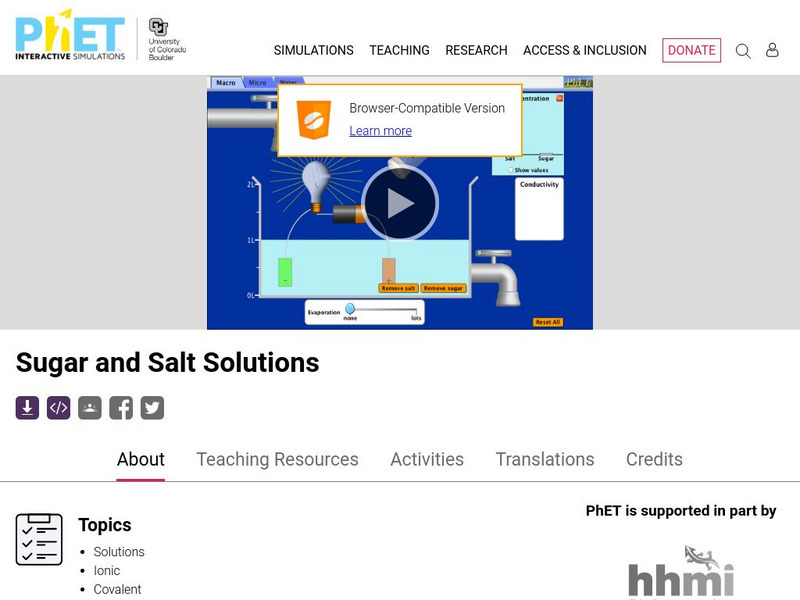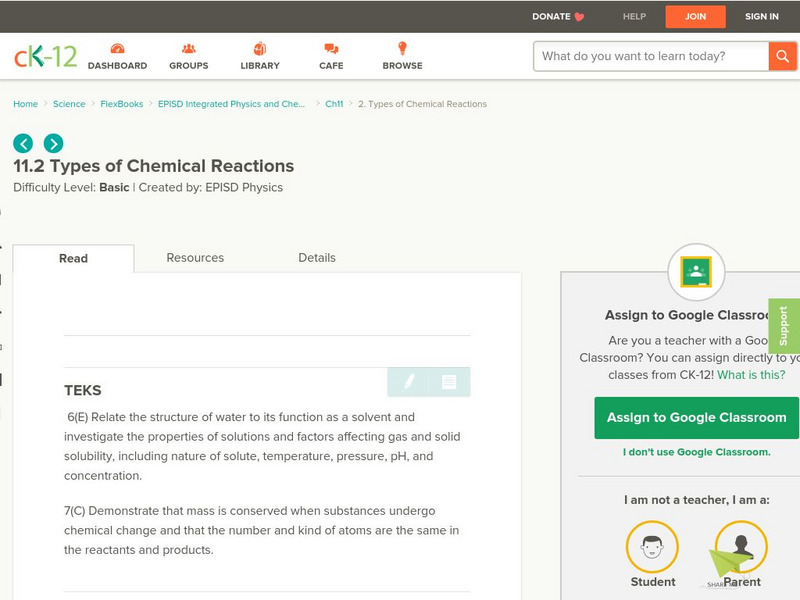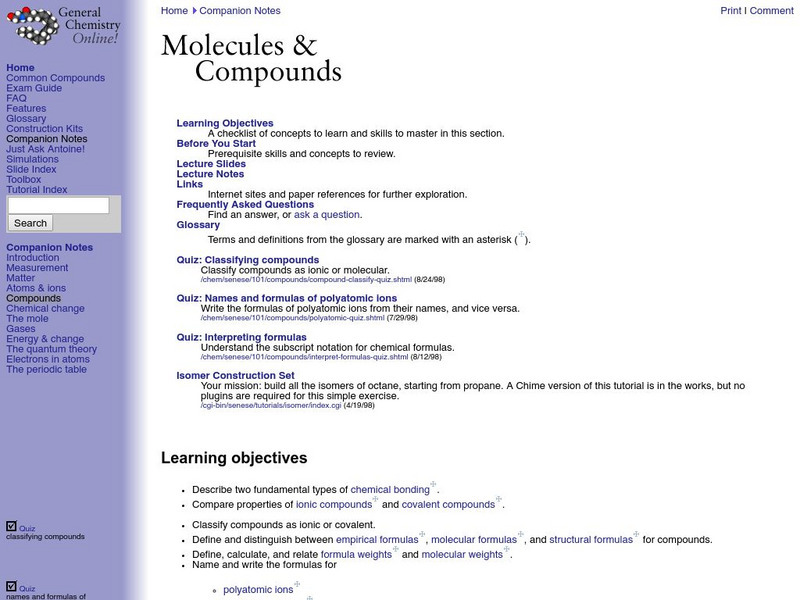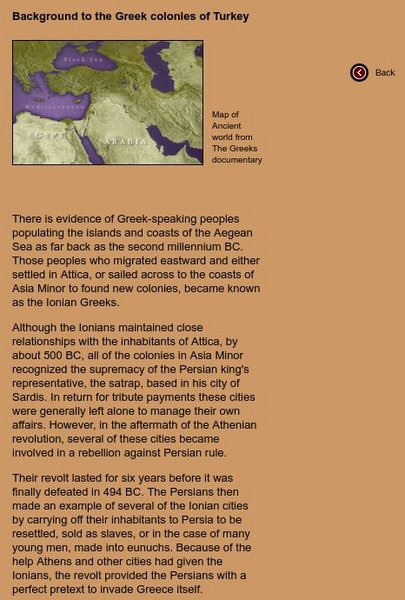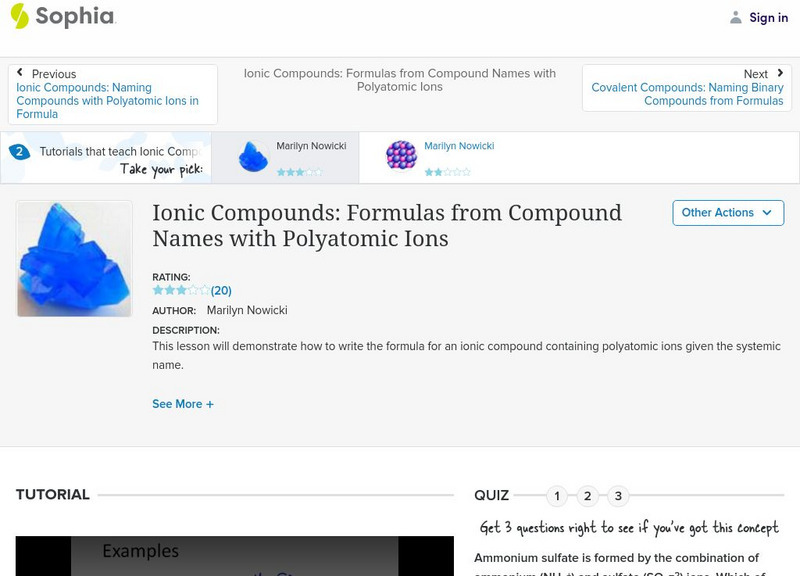Hi, what do you want to do?
Curated OER
Chapter 12 Review, Mixed Review: Solutions
Although there are only six questions on this chemistry handout, it makes a thorough review of solutions. Novices explain why a compound is not an electrolyte, identify types of compounds, and calculate moles, grams, and molalilties in...
Curated OER
Visual Art: Houses of Power
Students discover the influence of classic architectural styles on government buildings. To begin, they research the classical period of architecture in Greece and Rome. Once they feel confident, students use modeling clay to create bas...
Curated OER
Atoms and Elements: An Introduction
Students are able to discuss the difference between a proton, a neutron and an electron. They also can explain the difference between an ionic and a covalent bond. Students know the main structure of atoms and molecules. Student are able...
Curated OER
Naming Compounds
In this naming compounds worksheet, students are given a chart to determine if the compound they are naming is ionic, covalent or polyatomic. Students practice identifying and naming ionic, covalent and polyatomic compounds. They define...
Curated OER
Naming and Covalent Compounds
In this compounds worksheet, high schoolers practice naming compounds and classifying them as ionic, covalent, or polyatomic compounds. This worksheet has 12 fill in the blank and 12 problems to solve.
Curated OER
Of Electron Bondage
Students create models of ionic and covalent electronic bonds to demonstrate their understanding of these chemistry concepts. They explain how both ionic bonds and covalent bonds work so that younger students can understand.
Curated OER
How is the Strength of an Acid Determined?
Students study acids and how they can be measured. In this acid instructional activity students distinguish the properties that create strong and weak electrolytes.
Curated OER
Solubility of Ionic Substances
In this solubility worksheet, students identify substances as either ionic or molecular, define saturated solution and solubility, and calculate concentration of solutions. This worksheet has 7 short answer, 5 fill in the blank, and 27...
Curated OER
Precipitation, Acids and Bases, and Molarity
In this chemistry activity, students write the net ionic equations for any precipitation reactions that occur on mixing aqueous solutions for each of the substances listed. Then they write the net ionic equations for the acid/base...
Curated OER
Greek Columns
In this World History instructional activity, learners create three pockets which they cut and paste the images of the columns included on the sheet. Then, they gather photos of architecture found in magazines and taking photos of...
Curated OER
Architecture is Elementary
Students learn the four orders of architecture: Doric, Ionic, Corinthian and Composite. They create their own 3d structure and work together in groups. They create basic geometric shapes. # Have fun learning about art history,...
Curated OER
Creating Bonds
In this creating bonds learning exercise, students create 2-D and 3-D models of the molecular formula provided. Students complete a chart of information about the molecular formula given.
Curated OER
A Very Simple Conductivity Meter
Middle schoolers conduct a simple conductivity meter to test the ionic or non-ionic nature of water samples including one from their home.
Georgia Department of Education
Ga Virtual Learning: Physical Science: Bonding and Chemical Reactions
Through informational text, interactive puzzles, and review questions, students differentiate ionic and covalent bonds and identify the properties of each. They also use oxidation numbers to predict formulas of ionic compounds, name...
University of Oxford (UK)
Beazley Archive: Architectural Orders
Illustrated dictionary entry for Greek standard orders of stone architecture. Provides explanation of the three architectural types as well as picture examples.
University of Colorado
University of Colorado: Ph Et Interactive Simulations: Sugar and Salt Solutions
What happens when sugar and salt are added to water? Pour in sugar, shake in salt, and evaporate water to see the effects on concentration and conductivity. Zoom in to see how different sugar and salt compounds dissolve. Zoom in again to...
Other
The Active Eye in Architecture: Birth of a Column
A detailed study of the column, with some reference to its use in Renaissance architecture. Part of an online book about architecture by an amateur for amateurs.
CK-12 Foundation
Ck 12: Types of Chemical Reactions
[Free Registration/Login may be required to access all resource tools.] In this learning module, studnets will classify a chemical reaction as a combination, decomposition, single replacement, double replacement, or combustion reaction....
Khan Academy
Khan Academy: Biology: Chemistry of Life: Chemical Bonds
Review over covalent, hydrogen, and ionic bonding in this article. Learn how molecules are held together by chemical bonds.
Chem4kids
Chem4 Kids: Boron
Here at Chem4Kids.com you can find some great information about the 5th element in the periodic table, "boron." Content focuses on boron's electrons, where you can find boron in nature and in the home, and how boron combines with other...
Frostburg State University
General Chemistry Online: Molecules and Compounds
A complete lesson on compounds, from introductory material in the beginning to a practice exam at the end. This lesson covers bonding, ionic compounds, molecular compounds, naming compounds, structural formulas, polyatomic ions, and much...
PBS
Pbs: Background to the Greek Colonies of Turkey
Discusses the ancient Greek colonies of Ionia and their troubled relationship with the nearby Persian government.
Virginia Tech
Types of Equations
After learning about and reviewing the types of chemical equations and rules for balancing, students can practice balancing equations on interactive quizzes.
Sophia Learning
Sophia: Ionic Compounds: Formulas From Compound Names With Polyatomic Ions
This lesson will demonstrate how to write the formula for an ionic compound containing polyatomic ions given the systemic name.




















